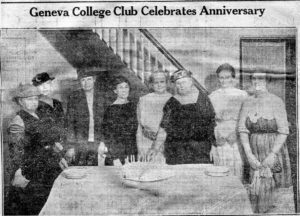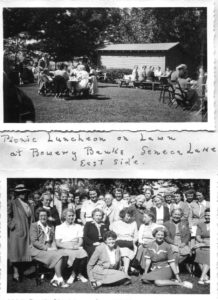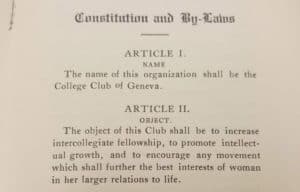When You’re Shut Out of a Club…Start Your Own
By Becky Chapin, Archivist
Well into the 20th century, women looking to increase their social and intellectual circle had few options beyond card parties and social visits. Clubs like the Catharine Foster Hopkins Art Reading Club and the College Club of Geneva were borne out of widening opportunities for women to attend college and a want to exchange ideas.
The founders of the College Club of Geneva came together after women were barred from joining a group of men who were developing a university club in 1909. The wives of those men were disappointed upon learning of their exclusion as there were many women who had attended colleges in the local area and wanted to connect. The founding of William Smith College coincided with this time as well, and the women were hoping to be able to support the new students.
The suggestion of forming their own club was proposed in the latter part of 1909 and six women began the process creating a constitution with bylaws and a list of potential members: Lynn Henry, Ella Truesdale, Lucy Wells Lansing, Esther Harding, Florence Parrott, and Alene Stewart (whom served as the club’s historian).
On June 13, 1910 twenty five women met at the high school and formed the “College Woman’s Club,” later renamed to the College Club of Geneva or Geneva College Club. Officers were appointed, and ideas were exchanged for the year’s programming. Their second meeting took place at the Experiment Station where they were able to inspect several departments and hear a talk from the Director, Dr. WH Jordan. Their third meeting was at William Smith where they met with the students, faculty, and inspected the school. Incorporation would follow on January 25, 1911. By 1931, there were 210 members.
Graduates from Elmira, Mount Holyoke, Wellesley, Smith, Vassar, Wells, William Smith and other co-ed schools would comprise the bulk of members for the next several years. Programs focused on local issues such as philanthropies, local civic organizations, and the social, academic, and religious activities of William Smith College. National and international issues were also addressed including Jerusalem, social services, education for women after the War, Serbian relief, and careers for women.

College Club of Geneva’s Anniversary Celebration, 1935
Many programs were literary or musical in nature, with visits from well-known performers, doctors, and campaigners. Among them were Chinese actress Soo Yong who gave a one-woman performance that was “highly entertaining…but instructive,” Ethel Frances Mundy, internationally known for the revival of wax miniatures, French activist Jacqueline deLeon, children’s author Kate Cox Goddard, and Broadway performer Ruth Enders.
The Club would support Geneva’s Dry Campaign, the Red Cross, Women’s Club, Prospect Avenue Scouts, the DAR, and the Geneva Public Library to name a few. They gave monetary gifts to various places including to the Women’s Club to help purchase their building, a desk for the Geneva Public Library, upkeep for the Company B truck, and to a memorial for Lena Gilbert Brown Ford, a graduate of Elmira College and lyricist of “Keep the Home Fires Burning” who was the first American civilian, with her son, to be killed in a London Air raid in 1918.

College Club of Geneva picnic, 1946
A scholarship for William Smith students was among the goals from the beginning, with profits from the Club’s Pulteney Tea Rooms going into that fund. Details on the Tea Rooms are sketchy, but they are advertised as being at 543 S. Main Street from 1916-1921, right at the Prouty-Chew House! The proprietor was Ilda McGee who lived at 730 S. Main Street and the Tea Rooms seemed mainly directed towards college students, with advertisements appearing regularly in The Hobart Herald. The program expanded and changed over the years, with the creation of a special committee, and the addition of scholarships for high school students in Geneva.
If you were a member, we encourage you to share your memories with us, as our records of the Club end in the 1970s.

